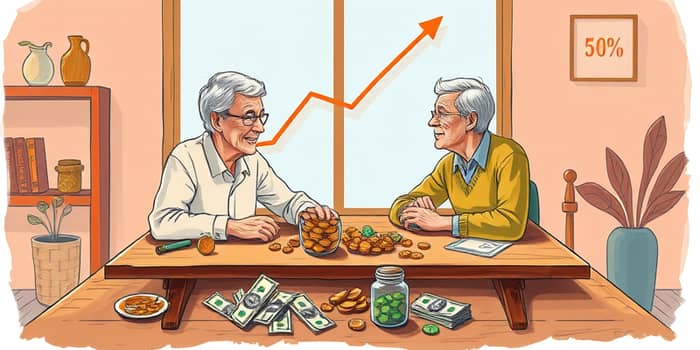Retirement marks a period of life to savor hard-earned freedom, but it also brings financial challenges. With the U.S. inflation rate at 2.4% in March 2025, every dollar in your nest egg is at risk of eroding purchasing power over time. This hidden tax on savings can slowly reduce the value of fixed incomes, pensions, and other retirement assets.
Many retirees rely on set monthly budgets, expecting that their savings will cover living costs for decades. However, inflation acts like a silent leak, gradually draining the real value of these funds. Understanding this erosion is essential for anyone striving to preserve wealth in later years.
Understanding Inflation and Its Effects
Inflation represents the general increase in prices for goods and services. As inflation rises, each unit of currency buys fewer items. Even a seemingly modest inflation rate of 2% annually can significantly impact long-term savings.
Imagine a retiree receiving a fixed annual income of $50,000. With a consistent 2% inflation rate, their purchasing power dwindles to around $40,000 over a decade. Sound planning must account for this invisible cost on your retirement and seek ways to mitigate its impact.
Historical Context and the Current Landscape
To fully appreciate inflation’s impact, consider historical examples:
Recent data shows inflation retreating from 6% in 2023 to about 3% in 2024, then moderating to 2.4% in early 2025. Despite this slowdown, prices continue to climb, and Americans are adjusting their retirement savings goals accordingly.
In 2025, retirees estimate needing $1.26 million for a comfortable retirement, down from $1.46 million the prior year. Still, 70% of retirees report that rising costs of living have eaten into their savings, while over 60% of pre-retirees doubt their nest egg will last.
Impact on Different Retirement Assets
Not all assets respond to inflation in the same way. Recognizing these differences can help you craft a resilient portfolio.
Cash and Bank Savings
Cash held in low-yield savings accounts is particularly vulnerable. Although banks may raise interest rates in response to inflation, earnings often lag behind price increases. Over time, this results in a net loss of purchasing power.
Leaving large sums in idle accounts can leave your capital at risk of slow decline against inflationary pressures.
Bonds and Fixed-Income Investments
When inflation pushes interest rates higher, existing bonds with lower yields lose appeal. Their market value drops, representing a hidden loss for bondholders.
Fixed-income vehicles like traditional pensions or annuities without cost-of-living adjustments (COLAs) are also susceptible. Without periodic inflation-based increases, the real value of these payments erodes over time.
Equities and Other Assets
Stocks can offer a hedge against inflation, as companies may pass higher costs onto consumers. Equities have historically outpaced inflation over the long term, though they come with market volatility.
Real assets—such as real estate or commodities—often track or exceed inflation rates. Including these in a diversified portfolio can provide additional protection and growth potential.
Healthcare Costs and Retirement
Healthcare expenses continue to outpace general inflation, creating a significant challenge for retirees. The average retiree is expected to spend over $165,000 on healthcare, a figure that climbed 5% in just one year.
This reality underscores the importance of planning for rising healthcare costs outpacing inflation. Health Savings Accounts (HSAs) and long-term care insurance can help alleviate this burden.
Strategies to Protect Retirement Savings
Proactive planning can reduce the impact of inflation on your retirement funds. Consider incorporating these key strategies:
- Invest in Treasury Inflation-Protected Securities (TIPS) for direct inflation adjustments.
- Diversify across asset classes, including equities, real estate, and commodities.
- Ensure portions of your portfolio have cost-of-living adjustments.
- Maintain a mix of fixed and variable income-producing investments.
Additionally, a disciplined savings approach and start saving for retirement early can compound benefits over decades. Frequent reviews will help you review and adjust your portfolio regularly, keeping pace with changing economic conditions.
Economic Outlook and Long-Term Planning
The International Monetary Fund predicts U.S. growth at 1.8% for 2025, reflecting trade tensions and lingering inflationary pressures. Slower growth can extend higher prices for longer periods.
Meanwhile, tax brackets and income thresholds are indexed for inflation, affecting withdrawal strategies and required minimum distributions. Understanding these changes ensures you don’t face unexpected tax burdens in retirement.
Conclusion
Inflation is an unavoidable force in any long-term financial plan, yet with foresight and adaptive strategies, you can safeguard your retirement years. By diversifying assets, embracing inflation-adjusted securities, and staying informed about economic trends, you can build a resilient portfolio designed to withstand price increases over time.
Your retirement should be a time of enjoyment, not financial anxiety. With careful planning and address inflation risk proactively and strategically, you can preserve the value of your savings and look forward to the future with confidence.
References
- https://news.northwesternmutual.com/2025-04-14-Americans-Believe-They-Will-Need-1-26-Million-to-Retire-Comfortably-According-to-Northwestern-Mutual-2025-Planning-Progress-Study
- https://www.morningstar.com/retirement/whats-changing-retirement-2025
- https://www.transamerica.com/knowledge-place/is-inflation-affecting-your-retirement-planning
- https://www.standard.net/lifestyle/2025/mar/05/layin-it-on-the-line-the-impact-of-rising-interest-rates-on-retirement-savings-insights-for-2025/
- https://www.certaintynews.com/article/the-silent-wealth-killer-inflations-growing-threat-to-retirement-and-estate-plans
- https://realinvestmentadvice.com/resources/blog/inflation-impact-on-retirement/
- https://www.westernsouthern.com/investments/the-impact-of-inflation-on-your-savings-and-investments
- https://www.selfemployed.com/news/inflation-concerns-impact-fidelitys-retirement-projections/










